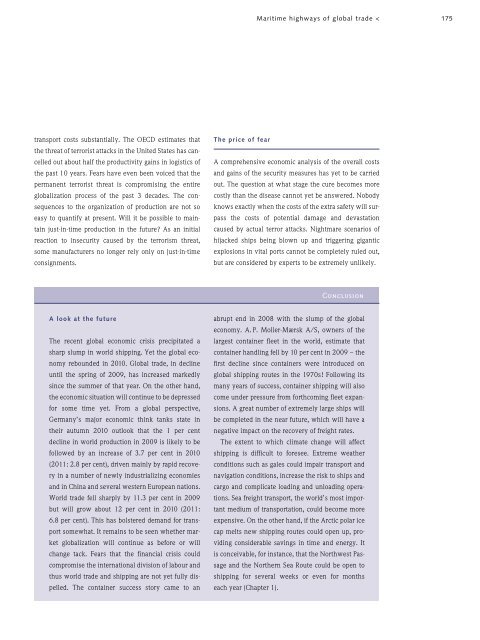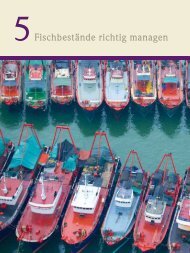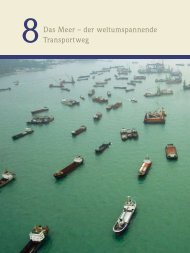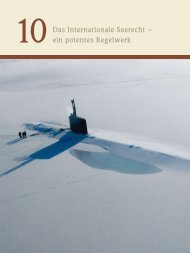Maritime highways of global trade - World Ocean Review
Maritime highways of global trade - World Ocean Review
Maritime highways of global trade - World Ocean Review
Create successful ePaper yourself
Turn your PDF publications into a flip-book with our unique Google optimized e-Paper software.
transport costs substantially. The OECD estimates that<br />
the threat <strong>of</strong> terrorist attacks in the United States has cancelled<br />
out about half the productivity gains in logistics <strong>of</strong><br />
the past 10 years. Fears have even been voiced that the<br />
permanent terrorist threat is compromising the entire<br />
<strong>global</strong>ization process <strong>of</strong> the past 3 decades. The consequences<br />
to the organization <strong>of</strong> production are not so<br />
easy to quantify at present. Will it be possible to maintain<br />
just-in-time production in the future? As an initial<br />
reaction to insecurity caused by the terrorism threat,<br />
some manufacturers no longer rely only on just-in-time<br />
consignments.<br />
A look at the future<br />
The recent <strong>global</strong> economic crisis precipitated a<br />
sharp slump in world shipping. Yet the <strong>global</strong> economy<br />
rebounded in 2010. Global <strong>trade</strong>, in decline<br />
until the spring <strong>of</strong> 2009, has increased markedly<br />
since the summer <strong>of</strong> that year. On the other hand,<br />
the economic situation will continue to be depressed<br />
for some time yet. From a <strong>global</strong> perspective,<br />
Germany’s major economic think tanks state in<br />
their autumn 2010 outlook that the 1 per cent<br />
decline in world production in 2009 is likely to be<br />
followed by an increase <strong>of</strong> 3.7 per cent in 2010<br />
(2011: 2.8 per cent), driven mainly by rapid recovery<br />
in a number <strong>of</strong> newly industrializing economies<br />
and in China and several western European nations.<br />
<strong>World</strong> <strong>trade</strong> fell sharply by 11.3 per cent in 2009<br />
but will grow about 12 per cent in 2010 (2011:<br />
6.8 per cent). This has bolstered demand for transport<br />
somewhat. It remains to be seen whether market<br />
<strong>global</strong>ization will continue as before or will<br />
change tack. Fears that the financial crisis could<br />
compromise the international division <strong>of</strong> labour and<br />
thus world <strong>trade</strong> and shipping are not yet fully dispelled.<br />
The container success story came to an<br />
The price <strong>of</strong> fear<br />
<strong>Maritime</strong> <strong>highways</strong> <strong>of</strong> <strong>global</strong> <strong>trade</strong> <<br />
A comprehensive economic analysis <strong>of</strong> the overall costs<br />
and gains <strong>of</strong> the security measures has yet to be carried<br />
out. The question at what stage the cure becomes more<br />
costly than the disease cannot yet be answered. Nobody<br />
knows exactly when the costs <strong>of</strong> the extra safety will surpass<br />
the costs <strong>of</strong> potential damage and devastation<br />
caused by actual terror attacks. Nightmare scenarios <strong>of</strong><br />
hijacked ships being blown up and triggering gigantic<br />
explosions in vital ports cannot be completely ruled out,<br />
but are considered by experts to be extremely unlikely.<br />
Conclusion<br />
abrupt end in 2008 with the slump <strong>of</strong> the <strong>global</strong><br />
economy. A. P. Moller-Mærsk A/S, owners <strong>of</strong> the<br />
largest container fleet in the world, estimate that<br />
container handling fell by 10 per cent in 2009 – the<br />
first decline since containers were introduced on<br />
<strong>global</strong> shipping routes in the 1970s! Following its<br />
many years <strong>of</strong> success, container shipping will also<br />
come under pressure from forthcoming fleet expansions.<br />
A great number <strong>of</strong> extremely large ships will<br />
be completed in the near future, which will have a<br />
negative impact on the recovery <strong>of</strong> freight rates.<br />
The extent to which climate change will affect<br />
shipping is difficult to foresee. Extreme weather<br />
conditions such as gales could impair transport and<br />
navigation conditions, increase the risk to ships and<br />
cargo and complicate loading and unloading operations.<br />
Sea freight transport, the world’s most important<br />
medium <strong>of</strong> transportation, could become more<br />
expensive. On the other hand, if the Arctic polar ice<br />
cap melts new shipping routes could open up, providing<br />
considerable savings in time and energy. It<br />
is conceivable, for instance, that the Northwest Passage<br />
and the Northern Sea Route could be open to<br />
shipping for several weeks or even for months<br />
each year (Chapter 1).<br />
175
















